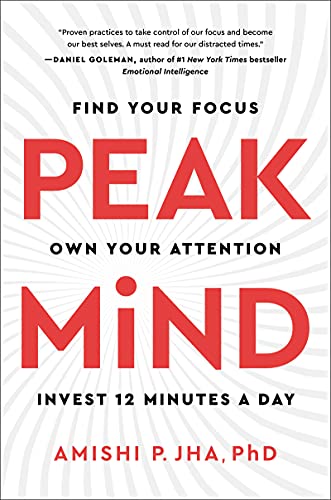
For episode 165 of the Metta Hour Podcast, Sharon speaks with Dr. Amishi Jha, Ph.D.
Amishi is Director of Contemplative Neuroscience and Professor of Psychology at the University of Miami. She leads research there on the neural bases of attention and the effects of mindfulness-based training programs on cognition, emotion, resilience, and performance in education, corporate, elite sports, first-responder, and military contexts. Her first book, Peak Mind: Find Your Focus, Own Your Attention, Invest 12 Minutes a Day, is coming out in October of 2021 from HarperCollins.
In this conversation, Sharon and Amishi speak about three different modes of attention as they are outlined in Peak Mind, Amishi’s new book. Amishi shares what her extensive research is revealing about how mindfulness affects the brain, and in turn, how these practices transform us from the inside out.
Learn more about Amishi and her work at amishi.com.
The Invisible Gorilla
Sharon welcomes Amishi to the Metta Hour Podcast, and inquires about what led to her interest in studying attention. They talk about the effects that constantly engaging with electronics and social media has on our attention, and Amishi shares the three different modes of attention she writes about in her book, Peak Mind. Sharon asks Amishi to describe the Invisible Gorilla Study.
“Through the course of evolution, we’re really designed to be able to snap to focus when something salient, or self-related, or threatening, or interesting, or tied to our survival was happening around us. And that’s exactly what happens, except that now it might be the ping of your cell phone calling you to look at a text, not necessarily a tiger that’s about to attack you.” – Dr. Amishi Jha, Ph.D
Joseph Goldstein explores the concept of wise attention on Insight Hour Ep. 79
Stress and Attention (14:05)
Amishi details the mindfulness training programs she has put together for people such as police officers and active service members who work under extremely stressful conditions. She and Sharon touch on the connection between attention and implicit bias, the need for spontaneous thought, and the best remedies for training our attention, such as lovingkindness practice.
“What we quickly realized is that things like a focused attention practice, or mindfulness of breathing – a very powerful thing to do – or a body scan, or open monitoring practices, as well as lovingkindness practices, these are all very powerful and important things to do, and we included those in many of these programs.” – Dr. Amishi Jha, Ph.D
Sharon Salzberg speaks with Nikki Walton about lovingkindness on New Growth Ep. 20
12 Minutes a Day (34:20)
Sharon asks Amishi about how she landed on 12 minutes a day as the baseline for a working mindfulness practice. They discuss Amishi’s work with the military, and how she’s among the first to research the effects of mindfulness training programs on active service members. Amishi talks about some of her current projects, including working with firefighters.
“With mindfulness, it’s not pharmacology where we’re going to precisely dose it and then give it out in pills…” – Dr. Amishi Jha, Ph.D



